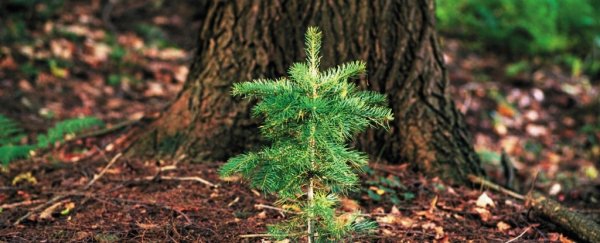The best and most diverse forests are the ones that plant themselves. It's something these amazing ecosystems have been doing for hundreds of millions of years, and some environmental advocates in the United Kingdom think we should simply get out of the way.
A new report from the environmental non-profit Rewilding Britain argues trees should only be planted by humans if natural regeneration is unlikely, or will take too long. First, we should try to prime and protect the land for normal growth.
The idea is nothing new in conservation circles, nor is it a tactic only under discussion in the UK. While planting trees holds many benefits for local environments and the wider climate, the best results depend on what, when, where and how a tree is planted and cared for.
Today, rapid reforestation attempts often produce monocultures or invasive tree species, ultimately reducing local biodiversity and access to land, water or food supplies within surrounding communities.
Even when it comes to carbon sequestration, experts think the quality of a forest might matter more than the sheer quantity of trees, although research in this field is limited.
In recent years, planting trees has emerged as a popular conservation strategy the world over, and yet many government policies do not even attempt to allow natural regrowth, which is cheaper and tends to have better environmental results.
Recently, the UK announced several tree-planting schemes, including a promise to cover 30,000 hectares of land with new growth.
But Rewilding Britain wants a more comprehensive and hands-off approach. It's asking government officials to explicitly incentivise natural regeneration in its rewilding policies.
"We can't replace our lost woodlands by planting alone," argues chief executive Rebecca Wrigley.
"Protecting ancient woodland fragments, and allowing and assisting trees to naturally regenerate on a big scale, is the most effective way of reversing the sorry fortunes of our crippled forests and woodlands, and so benefiting people, nature and the climate."
Letting forests regrow on their own could also be a lot cheaper in the long run, especially compared to the costs of managing invasive species, stopping imported disease outbreaks and producing plastic tree guards.
In situations where forests are too far away for natural regrowth, native tree seeds can be sown into the ground instead.
While some people might not like the look of the subsequent scrubland, it's this sort of terrain that provides the best habitat for young trees to take root. Once these forests begin to grow, their benefits are numerous.
A recent study published in September of 2020 found that natural regrowth was much better at sequestering carbon than active tree planting.
If the world put aside 1.67 billion acres for forests to grow and spread, the paper estimated trees and soil alike would absorb around seven years-worth of today's carbon emissions by 2050 - making it "the single largest natural climate solution" in humanity's grasp.
Turning those numbers into a reality is another matter. Restoring forests should be as easy as letting trees plant themselves, but on a practical level, it will probably require a balance of approaches.
In September, geographer Matthew Fagan told Science Magazine he thought the study was "a lightning step forward" but that natural regrowth alone is not going to save the planet.
Young forests, he says, are constantly being cut down for new farmland and ranches before they can reach their potential. In some cases, research suggests the harms of forest degradation are worse than active deforestation.
As such, land not only has to be put aside for regrowth, it also has to be protected and maintained. In the UK, for instance, setting aside land for rewilding will require local sheep and deer ranchers to give up new pastureland. In a rapidly changing world, competition for future land will only increase.
Rewilding Britain is therefore calling upon the government to protect ancient woodlands, provide better connected habitats, and let large chunks of wild land take care of itself, providing financial incentives and subsidies where necessary.
"Our ancient woodlands are only absent because we've destroyed them and continue to work hard to prevent their return through over-cutting, over-mowing and over-grazing," says Wrigley.
"If we let them, millions of trees would plant themselves across most of Britain."
Whether we plant or let nature take its course, the decision is up to us.
